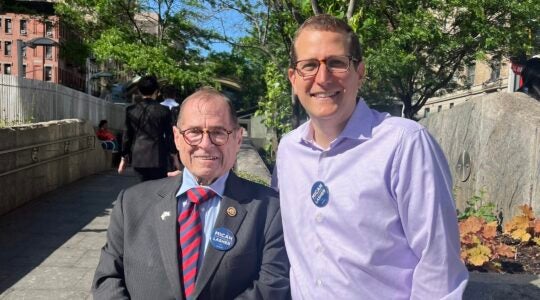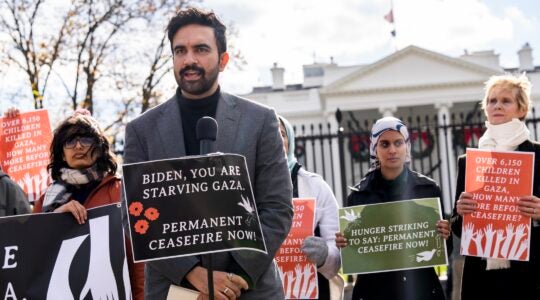COLUMBUS (JTA) — The Democrats are holding their debates in states that voted red in 2016, but which they hope to take from the Republicans next year.
It was Florida in June, Michigan in July, Texas (yes, Texas) in September and this month in Ohio, in suburban Columbus. Next month the candidates move on to Atlanta — Georgia is very much on the Democrats’ can-do list.
Columbus, the state capital, is blue. Tuesday night’s debate, however, was in Westerville, northeast of Columbus, which was red for years. A record 12 hopefuls came to Otterbein University, a private Christian institution, in an area that is overwhelmingly white. (While registering to cover the debate a day earlier, I witnessed a scene that seemed straight out of 1950s Hollywood: Open fields and leafy avenues leading to a stately campus, and a football team, the players suited up in white uniforms and cardinal red helmets, deep into practice.)
Those demographics are the point: Democrats flipped six seats in the Ohio House of Representatives last year by targeting disaffected white voters, and they believe they can repeat it in 2020. Before the broadcast of the CNN-New York Times debate, Democrats worked up the crowd by noting repeatedly that previous political events on the campus were strictly GOP — presidential nominees John McCain (2008) and Mitt Romney (2012) had spoken at Otterbein.
“Westerville is now blue,” David Pepper, the chairman of the state party, told the crowd. “Communities that used to be the base of the Republican Party are now blue.”
The debate itself addressed some of the issues that have preoccupied Ohio in recent years: opioid addiction, job loss and what that means for health care, and gun violence. But this one, for the first time in the faceoff among 2020 candidates, also focused substantially on the Middle East. That was mainly because of President Donald Trump’s decision to pull support for the U.S. Kurdish allies in Syria’s north — a call that has taken hits among Democrats and even major Trump backers in Congress — paving the way for a Turkish onslaught on the region.
Feeling anxious one shtetl over from Pittsburgh
I arrived on Sunday in the hours before the start of Sukkot and spent the holiday split between two synagogues — Tifereth Israel, a Conservative congregation, and Torat Emet, which is Orthodox. I enjoyed the sukkahs of the rabbis and congregants of both.
Those conversations were off the record, but I was able to confirm much of what I heard in on-the-record meetings and phone calls with members and officials of the Columbus Jewish community on Wednesday morning. The post-debate discussions took place at the Jewish Community Relations Council and were organized by Howie Beigelman, the executive director of Ohio Jewish Communities, which lobbies state government on behalf of eight Jewish federations, and Justin Shaw, who directs the Columbus JCRC.
I found a community of 25,000 that is overwhelmingly in the throes of a post-Pittsburgh anxiety, fretting about security and the dangers of the rise of the extreme right, and the perception that it has been emboldened by Trump’s presidency. The Jews there are preoccupied as well by burgeoning criticism of Israel among Democrats.
It’s a community that was concerned, too, about partisanship pushing apart folks who for years have gotten along whatever their affiliations, and how the preoccupation with fraught issues like security and anti-Semitism is diminishing the cultivation among the young of a positive Jewish identity.
Much of the security anxiety comes in part because of the proximity of Columbus to Pittsburgh — a three-hour drive away. More than one resident quoted to me remarks by Les Wexner, the clothing magnate and philanthropist whose name adorns an array of Jewish institutions, at a Columbus event just after the killings: Pittsburgh, Wexner said, is “one shtetl over,” an allusion to the turn-of-the-last-century pogroms. (Wexner through a spokeswoman declined to be interviewed.)
Since then, other events have fed the anxiety: The Aug. 4 mass shooting in Dayton, an hour away, which killed nine people was not carried out by a white supremacist, but it brought home the availability of guns. Another August incident involved the arrest of a man in Youngstown, less than three hours away, who allegedly posted on Instagram a video of a man shooting a gun while tagging the Jewish Community Center of Youngstown.
Alan Katchen, a longtime regional director at the Anti-Defamation League who now teaches history at a local university, said just being close to the events made them more immediate. He and his wife took a countryside vacation this summer, and in a nearby cabin was an EMT professional who had tended to the wounded after the Pittsburgh shooting. Now, he said, “I feel it when I go into synagogue, it happened at two synagogues, maybe it can happen at a third,” he said, referring to this year’s lethal attack by a white supremacist on a synagogue in Poway, California.
Beefing Up Security
Ohio Jewish Communities has helped secure millions of dollars in state funding for security for nonprofits, and also has taken a lead in advocating for funding on a federal level. Sen. Rob Portman, a Republican, is a champion of security funding. In shuls, signs posted thank the umbrella bodies for security funding.
Jackie Jacobs, the retired CEO of the Columbus Jewish Foundation, the fundraising arm of the community that last year merged with the Columbus Jewish Federation to form Jewish Columbus, said the crisis over security was spurring donations — but also detracting from traditional missions like Jewish education.
“One of the challenges for Jewish community organizations has always been to emphasize the positive elements of ‘why be Jewish’ and to shy away from fundraising based on threats and danger and ‘you should be Jewish because of the Holocaust,’” he said at the meeting. “Unfortunately, security issues are now drawing precious fundraising dollars and, because resources are finite, we’re going to have to balance that. It’s a long-term issue and a new reality.”
Brad Kastan, a longtime GOP giver who is on the board of JewishColumbus, the local umbrella body, said the shock was a necessary one; Jewish officials had become lax in dealing with security.
“The entire federation movement has been at fat camp, and we were one of the heavier people there,” he said.
Before the Oct. 27, 2018, attack on the Tree of Life synagogue complex in Pittsburgh, institutions may have had one private security guard or a single uniformed policeman. Now there is a more visible police presence. There were three police officers outside Torat Emet, smiling as congregants entered. They now provide sports scores to worshippers coming for Shabbat and holidays.
For all of that, it appears to be a young thriving community. Sukkahs were packed with toddlers and attendance was good at both synagogues for a holiday that fell on a weekday.
Casey Weinstein, a Democrat and a state legislator who initiated one of the pieces of legislation that fund security for nonprofits, described “an emboldening of white nationalism, and history has taught us what that means.”
Weinstein, speaking at the Otterbein campus after the debate, said there is an element in Ohio “of racist groups that have gained a stronger foothold in the Trump years in Ohio. There’s a combination of this resurgence of nationalist behaviors and guns. It’s a volatile mix that puts Jews at risk.”
Betsey Lane, a retired manager at Ohio Jobs/Family Services, whose husband, Bob, was a longtime director of the Jewish Community Relations Council, said at the meeting Wednesday that something had substantively changed. She recalled 35 years ago teaching at Jewish religious school in Middletown, a small town in an area where the Ku Klux Klan was once present, and said the threat was mostly of vandalism.
“People didn’t feel then they would be killed,” she said. “The gun situation was different 35 years ago than now, when these people can get together online, when they have a president saying they’re moral equivalents.”
Lane was referring to the occasions that Trump has equivocated in condemning neo-Nazis and racists. Wexner, a longtime GOP donor, quit the party last year (before Pittsburgh) because of his disgust with Trump. (Trump on other occasions has condemned anti-Semitism and white supremacists unequivocally.)
This is Ohio. We don’t talk about politics.
Lane speaking out so emphatically about Trump was an unusual occurrence. At the sukkah events, conservative and liberals tended to glance both ways before confiding political takes. One newcomer to the area that I met in a sukkah told me she noticed that local Jews often used conversational strategies like nodding or changing the subject if things threatened to get partisan.
Treading carefully on politics was typical of Ohioan Jews who seemed, at least anecdotally, to lean less liberal than their national counterparts, said Rabbi Lindsey Danziger, who directed the state’s office of the Reform movement’s Religious Action Center.
“In Ohio, we are diverse politically,” Danziger, who is based in Cincinnati, said in a phone interview. “There are a lot of Republicans in our leadership and in our clergy,” which is unusual for a movement that nationally trends unabashedly liberal. “We need to walk a walk to get to peace, to be a holy community. When we sit down and talk about the issues and don’t lead with partisanship, people see eye to eye.”
That means the RAC’s two issues, to feature at a lobbying day at the state Capitol next month, have bipartisan appeal: criminal justice reform and some form of background checks for gun buyers.
Danziger said a ballot initiative that was tougher on background checks was more appealing than one backed by Gov. Mike DeWine, a Republican, which has looser strictures, but the RAC was ready to back both. Danziger cited the Talmudic precept that saving one life is like saving a world.
“If Governor DeWine’s proposal saves two lives, the ballot initiative saves 20,” she said.
Danziger said the RAC also was seeking ways to address new state strictures on abortion.
The threat of polarization in the Trump era was unsettling. Gord Hecker, the former Jewish Columbus CEO, lamented the perceived drift among Democrats away from Israel, which has barely featured in the debates, where assurances of support for the U.S.-Israel relationship once were a mainstay of Democratic politicking.
Hecker said Democrats were oppositionally doing whatever Trump was not, and Trump’s pro-Israel moves, like moving the embassy to Jerusalem and recognizing the Golan Heights as Israeli, were driving the Democrats in the other direction.
“It’s Trump derangement syndrome, just like there was Obama derangement syndrome,” he said.
Cantor Jack Chomsky of Tifereth Israel, who is active in both J Street, the liberal Jewish Middle East lobby, and the centrist American Israel Public Affairs Committee, said he finds inhibiting disagreements over how Jews relate to Israel and the complications of the issue.
“In my home, our feeling is ‘don’t talk about Israel right now,’” he said over lunch at Scotty’s, a Jewish (but not kosher) delicatessen.
Ben Kanas, a student at Ohio State University who is active in Hillel and campus politics, has helped repel efforts to get the university to back the Boycott, Divestment and Sanctions movement targeting Israel. A Democrat who backs Sen. Elizabeth Warren of Massachusetts in the presidential stakes, Kanas said he was not too concerned about the BDS threat, although boycott initiatives have at times been narrowly defeated.
“I think our student government is very realistic, this is a distraction from making our school more accessible, more affordable, making textbooks cheaper,” Kanas, 21, said at a popular cafe near the campus. “There have always been iterations of anti-Israel bias on campuses, we happen to be seeing a new iteration of this on campus.”
In Other News
The Epstein factor
No, I did not go to Columbus and not ask about the elephant up the highway, the horsy white picket fence community, New Albany, that Les Wexner helped establish with Jeffrey Epstein, his longtime financial adviser who killed himself earlier this year while awaiting trial on sex trafficking and other charges.
Wexner has not fully explained his close relationship with Epstein, saying he broke with his adviser in the late 2000s only after he discovered financial improprieties, also around the time Epstein was first arrested on charges related to his sex trafficking.
What’s still unclear is why Wexner for so many years handed Epstein what The New York Times in an investigation described as “sweeping powers over his finances, philanthropy and private life.” Epstein allegedly used his relationship with Wexner, whose holdings include Victoria’s Secret, to assault at least one model. (I made clear in my overture to Wexner that Epstein was one of the things I hoped to discuss, perhaps explaining why he declined the interview.)
Columbus folks were defensive of Wexner, pointing out the breadth of his philanthropy in the city and worldwide. Those who met Epstein said he was extraordinarily charismatic.
Jacobs, the former CEO of the community’s fundraising arm, said also that the community was considering the same issues that the Epstein scandal had raised generally among philanthropies.
“Organizations are talking about new funding agreements” that would allow them to disassociate from donors who are involved in scandals,” said Jacobs, who had met with Epstein several times and did not appear impressed by his charisma. “There’s a sensitivity.”
Warren half a point, Sanders zero
Mark Mellman, who founded the Democratic Majority for Israel to counter Israel-skeptical voices within the party, says he is not in the business of ranking candidates, but he does have a take on the two leading progressives running for president, Bernie Sanders and Elizabeth Warren, and the folks they sign on to their campaigns.
Mellman this week blasted Sanders, the Vermont senator, for taking on as surrogates two activists seen as hostile to Israel: Linda Sarsour and Amer Zahr. Or, more precisely, for taking them on and not replying to his representations. (Mellman is a veteran Democratic pollster and his board is a who’s who of senior centrist Democrats, so he’s not off the mark in thinking he’d get a callback.)
“It’s deeply disturbing to find a candidate who claims to be ‘100 percent pro-Israel,’ opposed to BDS and a fighter against anti-Semitism surrounding himself with a number of surrogates and endorsers who hate Israel, support BDS and have repeatedly made anti-Semitic statements,” Mellman’s group said this week. “We privately communicated our concern about some of his choices directly to Senator Sanders, beginning with his naming of noted anti-Semite Linda Sarsour as an official surrogate. Unfortunately, the only responses we have received from the Senator are more hostile choices on his part.”
Mellman called me this week to say that Roger Lau, the campaign manager for Warren, did call back and assured him that Max Berger, a founder of IfNotNow, a Jewish group that is highly critical of Israel’s security policies, was not involved in any way on Israel policy or Jewish outreach.
Did that satisfy Mellman? More than the Sanders non-reply. But, Mellman added, “Who candidates choose to put in positions of influence in their campaigns says a lot.” (Sanders’ campaign did not reply to our inquiries about Zahr.)
Three-quarters of “The Squad” endorse Bernie
Sanders has been endorsed by all but one of the four freshman congresswomen who have become the vanguard of party progressives: Reps. Alexandria Ocasio-Cortez of New York, Rashida Tlaib of Michigan and Ilhan Omar of Minnesota. Omar and Tlaib back BDS and have been accused by some fellow Democrats of invoking anti-Semitic themes at times in their Israel criticism. Notably absent is Rep. Ayanna Pressley of Massachusetts, who said she is not ready to endorse and is, perhaps not uncoincidentally, the closest of the squad to the pro-Israel community.
The competition keeps getting younger
Shawn Fairbairn, of KidScoop Media, is the second Jewish reporter hat the outfit has sent to cover the debates. He likes frogs. Apples and honey, not so much.
Worth a look

Soldiers of the Turkish-backed Syrian National Army talk to local residents in Tel Abiad, Syria, Oct. 14, 2019. (Anas Alkharboutli/Getty Images)
There’s a lot being written about the strategic consequences of Trump’s green light to Turkey to go after the Kurds. Elizabeth Tsurkov, now a fellow at the Foreign Policy Research Institute, has been in touch for years with ordinary Syrians (including Kurds) experiencing the societal breakdown that has ensued since the launch of the civil war in 2011, never hiding from them her status as a Jew or an Israeli. Writing in the Forward, she describes some of the everyday ramifications of the president’s decision.
Tweet so sweet
House Speaker Nancy Pelosi is known, among other things, for her chocolate addiction. (She breakfasts on Dove bars.) Jack Burkman and Jacob Wohl are known, well, only for making up outrageous stories about liberals and Democrats. Pelosi had this take on their claim that they had found her “former drug dealer.”
Stay In Touch
Share your thoughts on The Tell, or suggest a topic for us. Connect with Ron Kampeas on Twitter at @kampeas or email him at thetell@jta.org.
The Tell is a weekly roundup of the latest Jewish political news from Ron Kampeas, the Jewish Telegraphic Agency’s Washington Bureau Chief. Sign up here to receive The Tell in your inbox on Thursday evenings.
JTA has documented Jewish history in real-time for over a century. Keep our journalism strong by joining us in supporting independent, award-winning reporting.






